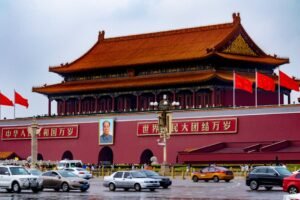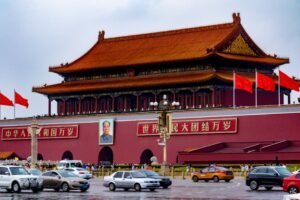For both foreigners and native speakers, navigating the Chinese job market demands not only professional talent but also an understanding of the subtle cultural and linguistic differences in the area. Let’s explore how to do very well in a Chinese job interview.
Table of Contents
ToggleUnderstand the Cultural Context
In Chinese culture, respect (尊重 – zūnzhòng) and humility (谦逊 – qiānxùn) are paramount. Exhibit courtesy, actively listen, and steer clear of overbearing behavior. While multinational companies might lean towards a Western interview style, local firms might appreciate traditional nuances.
Dress Appropriately
Opt for conservative attire. Men can don suits in subdued shades, while women should choose modest dresses or business suits. Erring on the side of formality is usually better.
Bring Multiple Copies of Your Resume
Often, multiple interviewers might be in the room. Hand out your resume, preferably translated into Simplified Chinese, and always retain an English version.
Practice Common Interview Questions
Later in this article, we’ll delve into some frequently asked questions. Familiarize yourself and rehearse your responses.
Be Punctual
Tardiness can be seen as a lack of respect. Aim to be there 10-15 minutes ahead of schedule.
Master Basic Chinese Business Etiquette
Expect a milder handshake than in Western contexts. When exchanging business cards, use both hands and carefully study the card before placing it appropriately.
Ask Questions
This signifies your eagerness and dedication. Draft your questions beforehand.
Follow Up
A thank-you note or email post-interview portrays your appreciation and continued interest.
25 Job Interview Questions in Chinese
你为什么想加入我们公司? (Nǐ wèishéme xiǎng jiārù wǒmen gōngsī?) – Why do you want to join our company?
你对哪些技能最自信?(Nǐ duì nǎxiē jìnéng zuì zìxìn?) – Which skills are you most confident in?
描述一次你解决困难的经历。(Miáoshù yīcì nǐ jiějué kùnnán de jīnglì.) – Describe a time when you overcame a challenge.
你怎么看待团队合作?(Nǐ zěnme kàndài tuánduì hézuò?) – How do you view teamwork?
你对这个职位的了解有多少?(Nǐ duì zhège zhíwèi de liǎojiě yǒu duōshǎo?) – How familiar are you with this position?
你之前的工作经验如何与这个职位相关? (Nǐ zhīqián de gōngzuò jīngyàn rúhé yǔ zhège zhíwèi xiāngguān?) – How does your previous work experience relate to this position?
为什么离开上一份工作?(Nǐ wèishéme líkāi shàng yī fèn gōngzuò?) – Why did you leave your last job?
你遇到的最大的职业挑战是什么?(Nǐ yùdào de zuìdà de zhíyè tiǎozhàn shì shénme?) – What’s the biggest professional challenge you’ve faced?
你如何处理工作中的压力或困难?(Nǐ rúhé chǔlǐ gōngzuò zhōng de yālì huò kùnnán?) – How do you handle stress or challenges at work?
你希望在五年内达到哪些职业目标? (Nǐ xīwàng zài wǔ nián nèi dádào nǎxiē zhíyè mùbiāo?) – What professional goals do you hope to achieve in the next five years?
你如何看待加班?(Nǐ rúhé kàndài jiābān?) – How do you feel about overtime?
描述一次你与同事发生冲突的经历及其解决方式。(Miáoshù yīcì nǐ yǔ tóngshì fāshēng chōngtū de jīnglì jí qí jiějué fāngshì.) – Describe a time when you had a conflict with a colleague and how you resolved it.
你如何对待失败?(Nǐ rúhé duìdài shībài?) – How do you handle failure?
你如何评估自己的成功? (Nǐ rúhé pínggū zìjǐ de chénggōng?) – How do you measure your success?
你认为一个好的领导者应该具备哪些品质?(Nǐ rènwéi yīgè hǎo de lǐngdǎozhě yīnggāi jùbèi nǎxiē pǐnzhì?) – What qualities do you think a good leader should possess?
你的长期职业计划是什么?(Nǐ de chángqī zhíyè jìhuà shì shénme?) – What are your long-term career plans?
你对工作有哪些期望?(Nǐ duì gōngzuò yǒu nǎxiē qīwàng?) – What are your expectations from this job?
你希望从这份工作中获得什么?(Nǐ xīwàng cóng zhè fèn gōngzuò zhōng huòdé shénme?) – What do you hope to achieve from this job?
你如何看待继续教育和培训? (Nǐ rúhé kàndài jìxù jiàoyù hé péixùn?) – How do you view continuous education and training?
在团队中,你更喜欢领导还是跟随?(Zài tuánduì zhōng, nǐ gèng xǐhuan lǐngdǎo háishì gēnsuí?) – In a team, do you prefer to lead or follow?
描述你处理多项任务的方法。(Miáoshù nǐ chǔlǐ duō xiàng rènwù de fāngfǎ.) – Describe how you handle multiple tasks.
你在团队中通常扮演什么角色?(Nǐ zài tuánduì zhōng tōngcháng bànyǎn shénme juésè?) – What role do you typically play in a team?
你对工作生活平衡有何看法? (Nǐ duì gōngzuò shēnghuó pínghéng yǒu hé kànfǎ?) – How do you feel about work-life balance?
你如何处理批评?(Nǐ rúhé chǔlǐ pīpíng?) – How do you handle criticism?
你对未来的职业发展有何期待?(Nǐ duì wèilái de zhíyè fāzhǎn yǒu hé qīdài?) – What are your aspirations for future career development?
By thoroughly preparing for these questions and understanding the cultural nuances, you’ll be well-equipped for your Chinese job interview.
FAQs
How should I handle the exchange of business cards?
When exchanging business cards, use both hands and study the card carefully before placing it appropriately.
Is it appropriate to ask questions at the end of the interview?
Yes, asking questions signifies your eagerness and dedication. It’s good to prepare questions beforehand.
Should I follow up after the interview?
Yes, sending a thank-you note or email post-interview is a gesture that shows your appreciation and continued interest in the role.
Are soft skills valued in Chinese job interviews?
Yes, interpersonal skills, teamwork, and your approach to challenges and conflicts play a significant role in the interview process.
What are some common phrases I can use to make a good impression?
Using phrases like “谢谢” (Xièxiè – Thank you), “请问” (Qǐngwèn – Excuse me/May I ask), and “很高兴认识您” (Hěn gāoxìng rènshí nín – Nice to meet you) can leave a positive impression.
Contact our head teacher, Chen Huimin, at info@lcchineseschool.com if you want to learn Chinese or have additional questions about our Chinese programs.
Sign up for a free trial class here.
Learn about our Internship Program in China.
Get free Chinese learning resources.







